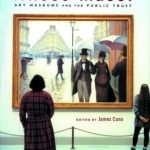Whose Muse?: Art Museums and the Public Trust
BookThis item doesn’t have any media yet
2006 | Reference
During the economic boom of the 1990s, art museums expanded dramatically in size, scope, and ambition. They came to be seen as new civic centers: on the one hand as places of entertainment, leisure, and commerce, on the other as socially therapeutic institutions. But museums were also criticized for everything from elitism to looting or illegally exporting works from other countries, to exhibiting works offensive to the public taste. Whose Muse? brings together five directors of leading American and British art museums who together offer a forward-looking alternative to such prevailing views. While their approaches differ, certain themes recur: As museums have become increasingly complex and costly to manage, and as government support has waned, the temptation is great to follow policies driven not by a mission but by the market. However, the directors concur that public trust can be upheld only if museums continue to see their core mission as building collections that reflect a nation's artistic legacy and providing informed and unfettered access to them.
The book, based on a lecture series of the same title held in 2000-2001 by the Harvard Program for Art Museum Directors, also includes an introduction by Cuno and a fascinating--and surprisingly frank--roundtable discussion among the participating directors. A rare collection of sustained reflections by prominent museum directors on the current state of affairs in their profession, this book is without equal. It will be read widely not only by museum professionals, trustees, critics, and scholars, but also by the art-loving public itself.
Related Items:
| Published by | Princeton University Press |
| Edition | Unknown |
| ISBN | 9780691127811 |
| Language | N/A |
Images And Data Courtesy Of: Princeton University Press.
This content (including text, images, videos and other media) is published and used in accordance
with Fair Use.
